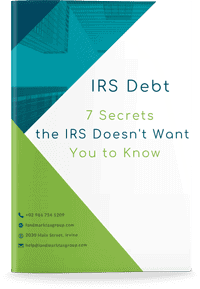Trust Fund Tax Penalty: The IRS Can Collect from You Personally

Trust Fund Tax Penalty
Trust fund taxes can cause big problems for small businesses. When an employer withholds a portion of their employee’s wages to pay income taxes, Social Security and Medicare taxes, that money is held “in trust”. It must be paid to the Treasury on either a monthly or semi-weekly schedule. Problems arise when the business uses those funds for other purposes, such as paying rent, utilities or suppliers. Typically, the employer has every intention of replacing the trust funds they “borrowed” but cash flow is tight, and back taxes accumulate faster than the company can pay them. Many business owners failed to realize when they prioritized other creditors over the federal government is that the IRS can collect business back taxes from you personally. They will also reach extends further than many people realize.
What are trust fund taxes?
When a business pays its employees, it does not cut them a check for all of the money the employee earned. The employer is responsible for withholding income taxes and the employee’s portion of Social Security and Medicare (FICA) taxes from the employee’s wages.
Your employees trust that you will send that withholding to the Treasury on their behalf. That’s why they are called trust fund taxes.
What happens when an employer doesn’t pay trust fund taxes?
When the IRS does not receive a federal tax deposit (or receives a deposit that is significantly less than the employer’s usual deposit), an IRS representative will attempt to contact the business owner. In the past, that first contact might not happen until the employer’s unpaid tax obligation and penalties had already begun to spiral out of control. In 2015 the IRS launched their Early Interaction Initiative to address payroll tax compliance proactively.
The Early Interaction Initiative identifies employers who appear to be falling behind on their tax payments or have a history of late payments. An IRS representative reaches out to the employer through a personal visit, recorded call, or letter. They will try to offer helpful information and guidance. This outreach may occur even before quarterly payroll tax returns are filed.
If early outreach does not address the delinquency, a revenue officer will launch an investigation. That investigation will focus on who has decision-making authority over the company’s finances. This is called a trust fund recovery penalty investigation, and it permits the IRS to collect unpaid trust fund taxes. They will not only from the business but from the assets of the individuals responsible for not paying withheld taxes.
What is the Trust Fund Tax Penalty?
The trust fund recovery penalty is equal to the balance of unpaid payroll taxes. It is based on the amount of unpaid taxes withheld and the employee’s portion of the withheld FICA taxes. The IRS also charges interest on the (Trust Fund Tax Penalty) TFRP. The responsible person may ultimately end up paying more than just the amount of unpaid payroll taxes.
Who can be held responsible?
If the IRS is unable to collect delinquent payroll taxes from the business, the trust fund recovery penalty may be assessed against anyone who is responsible for collecting or paying withheld taxes who willfully fails to collect or pay them. It could include any individual with authority to decide how the business’ available cash will be used. That may include officers of a corporation, shareholders, members of a board of trustees of a nonprofit organization, and employees with signature authority over bank accounts.
Responsibility is based on whether the person exercised independent judgment in deciding which creditors to pay. For instance, an employee who pays bills solely as directed by a supervisor should not be held responsible. An employee who determines which bills will or will not be paid can be considered responsible. Regardless of whether or not they have any ownership interest in the business.
“Willful” simply means that the responsible person was or should have been aware of the requirement to remit the trust fund taxes. They also either intentionally disregarded the law or was indifferent to its requirements. Using available funds to pay other creditors instead of the IRS is an indication of willfulness.
What happens next?
Once the revenue officer determines who is responsible, the officer will send a letter stating their plan to assess the trust fund recovery penalty. The recipient of the letter has sixty days to appeal. Once the IRS asserts the penalty, it can begin attempts to collect against the responsible party or parties’ personal assets. That may include filing a federal tax lien or seizure of assets. Trust fund recovery penalties are typically exempt from bankruptcy discharge.
In extreme cases, failure to pay trust fund taxes can even lead to criminal charges. A willful failure to collect and remit trust fund taxes is punishable by up to a $10,000 fine, five years in prison, or both. However, the IRS typically reserves criminal charges for the most extreme cases. Only, where trust fund taxes were diverted for personal use.
What can you do about the Trust Fund Tax Penalty?
The IRS is aggressive in assessing trust fund recovery penalties. If you fall behind in your payroll tax obligations, it is crucial to address the situation as soon as possible. There are options for resolution of penalties, including an offer in compromise, installment agreements, appeals and even litigation. These options can be complex and expensive. The best way to avoid trust fund recovery penalties to make every effort to pay your taxes, even if that means prioritizing the government over other creditors. Otherwise, you’ll need help from an experienced tax relief professional to guide you through the necessary steps to avoid penalties.
Get our Special Report: 7 Secrets the IRS Doesn’t Want You to Know!
Not only are we licensed Tax Relief Specialists we are also former Senior IRS Agents now serving the best interests of taxpayers just like you. All we do is IRS Tax Relief matters, all day every day. Contact us for a no-obligation consultation.
Learn how we can help with your tax matter. Visit our Help Menu today for immediate assistance from our Licensed Enrolled Agents and former IRS Collectors. We look forward to serving you!




